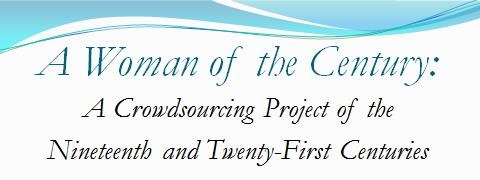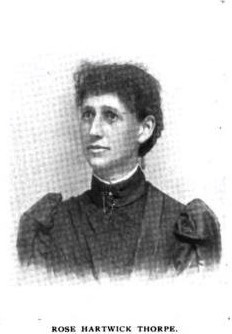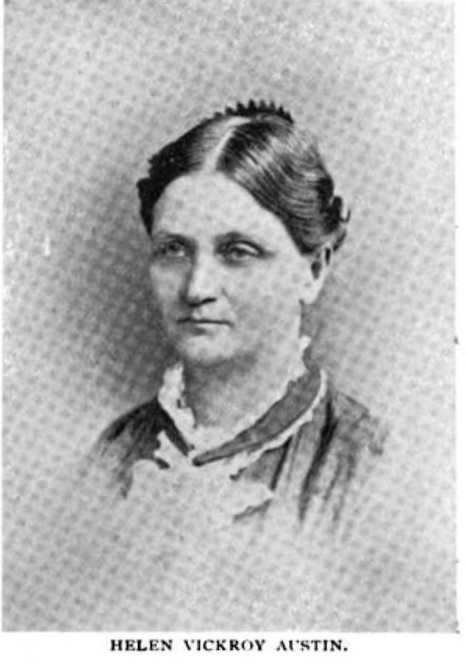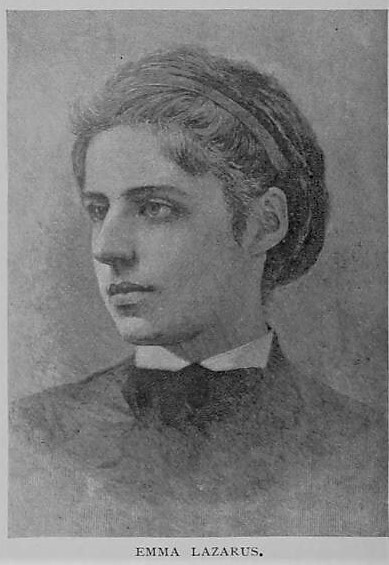July 16 - July 22
Women of the Week
Poet Rose Hartwick Thorpe, journalist and horticulturalist Helen Vickroy Austin, and poet and author Emma Lazarus are this week's Women of the Week.
-
To learn about them by viewing their items, please click on their images.
-
To read their biographical sketches in A Woman of the Century, please click on the highlighted page(s) number to the left of their images.
Rose Hartwick Thorpe was born in Mishawaka, Indiana on July 18, 1850, and she spent her teenage years in Litchfield, Michigan.
She became famous for her poem "Curfew Must Not Ring Tonight," which was published in the Detroit Commercial Advertiser in 1870.
Rose married Edmund C. Thorpe in 1871. Their family expanded to include a daughter, and the Thorpe family lived in Chicago, Illinois.
She became the editor of three monthly periodicals, Temperance Tales, Well-Spring, about the home, and Words of Life, a Sunday School monthly, all published by Chicago publisher Fleming H. Revell.
Later, while she was living in Grand Rapids, Michigan in 1883, Rose was awarded an honorary M.A. degree from Hillsdale College. The same year, "Curfew Must Not Ring To-Night" was published as a book.
Due to Mr. Thorpe's health issues, the family then moved to San Antonio, Texas and resided there for four years. In the late 1880s, Rose and her family moved again, this time to San Diego, California. She kept writing, and Ringing Ballads, including Curfew Must Not Ring Tonight made its debut in 1887.
During her long and successful career, Christian Science Journal, Detroit Free Press, Happy Days, Our Continent, St. Nicholas, Wide Awake, and Youth's Companion published Rose's work.
In 1895, "Curfew Must Not Ring Tonight" was published as a song, with music by Stanley Hawley. During the same year, Rose wrote the "Introduction" to As Others See Us, or, The Rules and Customs of Refined Homes and Polite Society. She published The Poetical Works of Rose Hartwick Thorpe, Compiled by the Author in 1912.
When Litchfield, Michigan celebrated its anniversary in 1934, Rose wrote the Centennial Theme Song. In addition, July 21 was designated Rose Hartwick Thorpe Day and the Rose Hartwick Thorpe Memorial was dedicated.
Rose passed away in 1939.
Helen Vickroy Austin was born in Miamisburg, Ohio on July 19, 1829. She later lived in Ferndale, Pennsylvania, Richmond, Indiana, and Vineland, New Jersey. Helen married William W. Austin in 1850 and became the mother of three children.
She was a horticulturalist, journalist, philanthropist, reformer, temperance worker, and suffragist.
On May 18 and 19, 1870, Helen, her sister Louise Esther Vickroy Boyd, her brother-in-law S.S. Boyd, and other local women and men led the Mass Convention in the Lyceum Hall in Richmond, Indiana to discuss women's rights. By June of 1872, she was serving as corresponding secretary of the Indiana Womans' Suffrage Association. Helen also served as Secretary for the Woman's Christian Association in Richmond during that decade. By 1874, she was a correspondent for The Daily Independent.
Helen was a member of the Daughters of Temperance, the National Woman's Indian Rights Association, the Indiana Woman's Suffrage Association, the Woman's Christian Associaiton, and The Travelers' League.
She passed away on August 1, 1921.
Emma Lazarus was born in New York, New York on July 22, 1849 and died there on November 19, 1887.
Emma was inspired and mentored by Ralph Waldo Emerson. In 1868, she mailed her book to Ralph Waldo Emerson which resulted in a mentor-mentee relationship. For a few years, Emma asked him for feedback on her poems, and Emerson gladly provided critiques and praise. A rift occurred in their relationship in 1873, as Ralph Waldo Emerson did not publish her work in his anthology, Parnassus. Emma never found out why he did not her print her work, since he never responded to her letters.
Miss Lazarus volunteered at the Hebrew Immigrant Aid Society (HIAS) after visiting Russian Jewish Immigrants living in squalor at Ward Island. These immigrants had left Russia due to the Czar’s ongoing pogroms and other antisemitic acts. The HIAS, which was formed in 1881, provided meals, transportation, and employment counseling.
That same year, Emma wrote several poems for a broad range of audiences concerning the antisemitism occurring in Eastern Europe, particularly Russia. Her poems, "The Banner of the Jew," "The Exile," and "The Death of Death" (she dedicated this to "George Eliot," for her inspiration and dream of a Jewish nation), portrayed the tragic suffering and degradation of her people (Jews). Emma was an early proponent of what became the Zionist movement. Her views are illustrated in her “Epistle for Hebrews."
Emma wrote"The New Colossus," a sonnet, in 1883 as part of fundraiser for the Statue of Liberty's pedestal. She wanted others to know that this poem voiced support for the immigrants coming to the shores of New York City. Unfortunately, Emma did not live to see the fruit of her labor. It was 1886 by the time sufficient money was raised to erect the statue in New York Harbor, and Emma passed in November of 1887, before its completion. To honor Miss Lazarus's work, her friend, Georgina Schuyler, had Emma's poem engraved on a plaque which was mounted on the statue's pedestal.
Her volunteer efforts and ideas also led to the creation of the Hebrew Technical Institute, which was formed in 1884 in New York City. This non-sectarian facility provided training in vocational skills for students ages 14-17. Later, it became known as the first technical high school in America.
In 1944, The Emma Lazarus Federation of Women’s Clubs was founded by the Women’s Division of the Jewish People’s Fraternal Order of the International Workers Order. Its mission was three-fold: to provide relief to wartime victims, to combat racism and antisemitism, and to foster Jewish identification through its educational programs and women’s rights.
To honor Miss Lazarus's accomplishments as a famous poet, Ruth Hollander, a senior from Tucson High School, was elected president of the newly formed Emma Lazarus B'nai B'rith Women’s Group in March, 1951.



